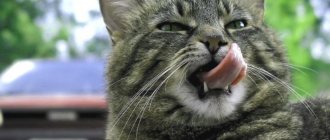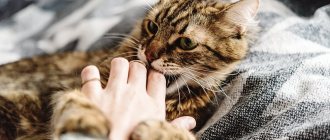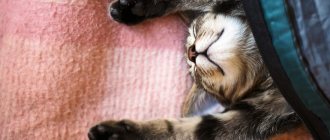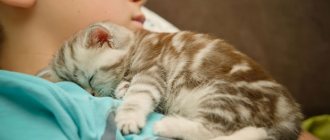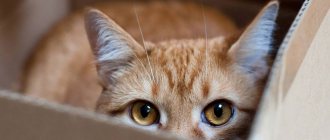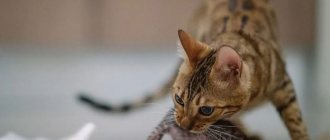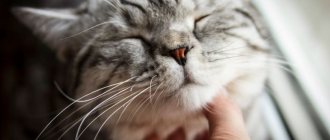Marks
scent glands on the cheeks, forehead, near the ears, chin and at the base of the tail.
, so when she rubs against a person or “butts” him, she is simply marking him. Kittens usually learn this behavior from their mothers.
Cats have a highly developed sense of smell, which they rely on to receive a significant amount of information about the world around them. In order to distinguish familiar people/animals/objects from unfamiliar ones, she needs to put the “I was here” or “I know him” mark on them. She wants to live among familiar smells
to feel confident and safe. At home, cats most often rub against corners, because instinct tells them that it is at the corner, that is, at the intersection of at least two passages, that there is a greater chance of meeting another animal and showing it that someone was here before it.
Interesting
, that if a person comes home to his cat from guests, where their cat rubbed against him, his own cat will try to “re-mark” these marks and therefore will rub with redoubled force. Moreover, cats are more prone to this than cats.
Over time, the marks evaporate, so cats have to regularly rub their faces on people's legs and on all suitable objects in the house.
Begging
Since the feeling of pleasure from food is similar to the feeling of pleasure from scratching behind the ear, the cat begins to ask for food in the same way as it asks for affection, that is, it rubs against the owner. If she is accustomed to receiving food at the first “meow”, then all this will also have a sound accompaniment
.
If you do not want to teach your cat to beg in this way, from the very first days do not pet her when she rubs, because this is not what she means.
How does your cat greet you? How does she say "hello"?
Most owners are well aware of the habit of cats to rub against their legs and understand that in this way the cat demands attention to it. Of course, this may just be a reminder that your beauty wants to eat, but cats often rub against their legs when they have enough food. Leg rubbing is a form of greeting, it's a cat's way of saying, "Hi, I know you, I'm glad to see you, I trust you." When a cat rubs against you, not just your legs but other parts of your body, it leaves a scent on you, marks you, signals that you belong to it. Cats have scent glands in several places on their heads, under the ears, on the chin and around the eyes, as well as in other places on the body.
But your cat also rubs and leaves scent on furniture, doors, and other inanimate objects. If she is allowed to roam outside the house, she will also scent-mark trees, plants, poles, and the like. Does this mean that you mean as much to a cat as a chair or a tree? No, of course not.
Your cat uses her scent to mark inanimate objects to indicate the boundaries of her territory, to let other cats know that this is her domain. Of course, you are also part of her world, but we hope that you mean a little more to her than table legs or a pillar. To understand how much your cat loves you, observe other forms of cat greeting behavior.
Head banging
Does your cat allow you to pick her up when you come home? This in itself indicates her trust in you, but if she also rubs her muzzle against your face, this means that she loves you very much.
Has your cat ever bumped its head on you? This is a very intimate cat greeting, reserved only for cats and special people whom the cat trusts very much. If your cat greets you by bumping her head on your face or nose, you can be sure that she is happy to see you. This behavior comes from childhood, when the kitten bumps against its mother, giving a signal that it is time to feed it.
Try extending your hand just above your cat's head when you open the apartment door. Your cat may climb up on her hind legs only and bump or nuzzle her head into your hand. This is a very enjoyable and fun activity.
If your cat doesn’t do this, don’t think that she doesn’t have affection for you, it’s just that each cat is individual and this behavior may simply not be typical for it.
Greeting a sleepy cat
What do you think when you are away all day and your cat is left alone at home, what does she do? Yes, your cat sleeps most of the day. So it's likely that when you walk through the door, you're disturbing her peaceful slumber. How will your sleepy cat greet you? Wake up cats usually greet their owner by rolling on their backs and stretching out their paws, while extending their claws and yawning. By doing this, they expose their belly, making themselves vulnerable to attack, so this is not a greeting reserved for strangers, this greeting is only intended for people whom the cat trusts very much. Be careful, because if your cat greets you by sticking out her tummy, this does not mean that she will allow you to scratch or pet it, watch her claws!
As stated above, all cats have their own unique personality, so their greetings will be very different. If you have several cats living in your home, each of them will greet you differently.
A cat who lives with several cats or other pets will not be as dependent on humans for companionship, and therefore will not be as welcoming to you as a cat who is the only animal in the house. Also, if you have multiple people living in your home, your cat has many ways to get attention and will be less happy to see you. Cats that are outdoors occasionally are also not as dependent on their owners, can fill their day with many outdoor adventures, and are often part of a social cat system outside of their home. This doesn't mean that outdoor cats or cats that live with other people or animals can't show you affection, they certainly can, but they don't have the same need for love and attention as a cat. being alone all day. Age can also be a factor in how a cat greets you; for example, an older cat may not have as much energy as she once did, so she may not seem thrilled to see you.
You must know the special way a cat greets you. Your cat may not use head banging or back rolling in front of you to say hello, but even if your cat seems very wild, aloof and uninterested, she will still have some way of greeting you. Even if this method is just a quick glance in your direction before you start washing your face. This way, at least she shows that she is aware of your presence.
Why do cats rub against their owners' legs or various objects? If you have a cat living in your house, then you have probably asked yourself this question at least once in your life. It's time to get a detailed answer to it.
It is unlikely that cats rub against their legs or objects just because their head, ears or neck itches all the time. Sometimes it seems that the cat is trying to attract your attention in this way, but doesn’t she have a thousand other ways to get what she needs from you? Let's find out the truth.
Territory demarcation is why cats rub against objects
Territory demarcation is another answer to the question of why cats rub against various objects. Dogs mark their territories by urinating in certain places or digging in the ground, cats rub against objects or things, preferring to leave their unique scents on them. If you have more than one cat at home, you may notice that the cat first sniffs a specific object, then arches its body, and then begins to rub against that object. And multiple cats may rub against the same area. The purpose of this behavior is to increase the feeling of togetherness and show that they are a member of a close-knit group. By the way, if a cat rubs against your legs when you enter the house, you can be happy - this indicates that you have been accepted into the cat group.
Why do cats rub against objects and how are pheromones related to this?
Special scent glands can be found throughout a cat's body. They are located on the head, including the chin, lips, cheeks, tail and sides. These glands secrete chemicals we know as pheromones.
. When a cat cuddles and rubs against other cats or its owners, it releases pheromones. Humans cannot smell this smell, but other cats smell pheromones very well.
In order to enhance the smell of pheromones, a cat chooses relatively high objects and actively rubs its head against them, where the glands secreting this substance are located in large numbers. The smell of a pheromone can convey the reproductive status of its owner and other information about him, which is easily read by felines.
The reasons for this behavior of the animal
Cats are territorial predators. They mark their territory with urine and specific odorous substances that are secreted by endocrine glands. For cats, smell is a “friend or foe” recognition system.
The cat's whiskers, that is, its whiskers, are covered with such volatile compounds. There are glands on its face that secrete substances so that the cat can mark its territory, objects and people that belong to it.
The pet quite sincerely believes that people belong to her, and not vice versa. Therefore, the cat rubs its muzzle, standing up on its hind legs, and as if falling forward. This way it activates the glands that secrete odorous substances. In a similar way, she rubs against the corners of buildings and cabinets, various objects and the legs of her owner. When meeting a person from work, she tries to destroy other people’s unpleasant odors on his clothes and skin, trying to “reward” him with “her” smell, the aroma of pride. The cat rubs against its personal belongings almost every day: food tray, house, etc.
Kittens and young cats that have not had time to assert themselves rub against a person’s hands, poke their faces into his arms or legs, because they need protection and patronage. They caress, hoping that in return the person will give them protection and make them a companion.
Although the cat is considered to be a "walking on its own" animal, it is social to a certain extent. That is, it needs communication. A domestic cat can satisfy its need for communication and energy exchange only by playing with its owner. Or by climbing onto his lap and allowing himself to be caressed. With a lack of attention, the animal can vigorously rub not only against the owner, but also various objects, fidget around the floor, attracting attention.
By rolling in the dust and shaking the ground, bathing in “puddles” of dust, the animal may try to remove static electricity that periodically accumulates on the fur.
Some breeders notice that a new thing in the apartment causes increased interest in the cat. She sniffs it, rubs her muzzle against it. The reason for this behavior is also the smell that comes from the new thing. The cat tries to make the thing “its own” on its territory, in addition, this is how the animal gets to know the new thing in the house.
A cat may rub against its owner's legs in the kitchen if it is very hungry or wants to try a delicacy from the table. This is how she shows her request, showing affection mixed with persistence.
The causes of friction are not always harmless. It happens that this behavior is caused by pathological conditions that cause discomfort to the cat.
Friction is pathological if it is intrusive in nature, the animal gets tired of it and wears out the skin to small abrasions.
Normally, the animal falls at the owner’s feet or objects in the house no more than 2-4 times a day. In diseases, friction occurs almost hourly and lasts for a long time.
By the way, in this case, the cat usually rubs not only its muzzle or body, but also its anal area on the floor, its head on the walls, and rubs its own parts of the body with its paws.
With pathological friction, the cat’s behavior also changes, and other symptoms are added. The owner should pay close attention to the cat’s condition if the following symptoms are observed:
- the cat has become lethargic and apathetic, or, on the contrary, it is overly intrusive, and aggressiveness may appear;
- the animal does not purr when rubbed, plaintive meows may appear;
- the cat refuses to eat and does not allow the sore spot to be touched;
- lacrimation appears, eyes and ears fill with pus;
- Vomiting and diarrhea appear.
Pathological friction is a sign of itching or discomfort that can be caused by:
- parasites;
- ear mites, due to which cats experience severe itching;
- inflammation of the glands of the anorectal zone;
- constipation associated with bowel disease, foreign objects and other problems;
- pain in the eyes as a result of injuries and inflammatory processes (in this case, the cat will rub its muzzle against the corner and continuously touch its muzzle and eyes with its paws);
- when there is pain in the ear, the cat will press the sore spot to the ground or floor and try to rub it in this way, while breeders often note a plaintive meow;
- an allergic rash causes severe itching all over the cat’s body, so the animal can rub not only its head, but also its body, roll on the floor, turning from side to side;
- pain in the head is manifested by a desire to rub the top of the head against various objects and the hands of the owner.
Other reasons why cats rub against objects
Subscribe to our YouTube channel!
Cats rub against objects to signal to animals of the opposite sex that they are ready to mate. During this period, cats are actively looking for females. Another reason why cats rub against objects is to gain more information about other cats or cats or about a person they are not familiar with. Head rubbing can also be a way of greeting a cat, and in the wild it is a way for felines to demonstrate their loyalty to the group.
Sometimes a cat rubs against objects when it tries to adapt to a new environment, where it found itself for the first time and with which it is not yet familiar. Pheromones at this moment have odors that make it possible to determine that the cat is tense and trying to relax. After the cat calms down, it will again rub itself against objects to convey new information.
Why do cats rub against their legs?
Bad Excellent
Why do cats rub against their legs?
Sometimes the behavior of a cat is quite difficult for humans to understand, because they express their emotions in a completely different way. For example, why do cats rub against their legs? At the same time, they look like they are having great fun and purr contentedly. There are several reasons why cats rub against furniture, corners in the house and on the street, as well as people’s legs.
Smell is a very important sense for cats, sometimes even more important than vision. A person who does not have a cat at home may be surprised by some of its habits, including the habit of rubbing against pieces of furniture, corners and people's legs. This is typical for both male and female cats. So, what is the reason for this strange habit?
The reason why cats rub against their legs. there is a desire to mark objects located on “their” territory. Thanks to this, the cat can subsequently recognize a familiar environment and feel confident in it.
To apply “marks,” cats use special temporal glands on both sides of the forehead, between the ears and eyes. Similar glands are also located near the corners of the lips and on the tail; they perform a similar function. That is, they secrete an odorous secretion that the cat can leave on doors, stair railings, and furniture legs. To do this, the pet rubs its head on the surface, and can also move its tail raised along the surface.
Often, wanting to show favor to a person, a cat leaves its marks on him, purring contentedly and rubbing his tail and muzzle on the person’s legs. Firstly, in this way kittens are accustomed to expressing their affection for their mother cat, and, secondly, this is how the animal identifies you as “part of its territory.”
Another reason why cats rub. is communication between relatives. Other cats, sensing such a mark, will definitely stop to sniff, and, perhaps, leave their own nearby. In this way, they exchange information about their condition, and something else that only cats understand.
A cat is an affectionate, dependent and at the same time freedom-loving animal. Each person takes a small pet into their home for different reasons. Some people need a cat to catch mice, others to absorb negative energy, and still others bring a pet into the house as a full member of the family. But everyone has undoubtedly observed the phenomenon when a cat rubs against a person and surrounding objects. Why does a pet do this, and is it possible to drive it away from you? Let’s figure it out in this article.
What else you need to know about your cat's behavior
Now that you know why cats rub against your legs or other objects, we'll give you more information about other aspects of your cat's behavior.
Purr
Purring is usually a sign that your cat is in a good mood. Unfortunately, this is not always the case. Purring can also indicate that the cat is not feeling very well and even signal an injury to the animal.
The cat energetically waves its tail
If you notice that the cat is wagging its tail quite quickly, this indicates that the animal feels threatened and is ready to show aggression. In these circumstances, assess how safe your cat's environment is and then offer food to calm your pet.
Cat hissing
If a cat meows very loudly or hisses aggressively, this indicates that she is unhappy with what is happening around her, and also that the animal does not feel safe.
Meow
Cats usually meow
almost exclusively for people to communicate with. And each cat adapts its own meowing “language” for its owners. So, if you spend a lot of time with your cats, then learn to understand what this or that meow means and what exactly your pets require from you.
Author of the article
: Ilya Samokhvalov, Moscow Medicine©
Disclaimer
: The information presented in this article about why cats rub against their legs and objects is intended for informational purposes only.
The article presents information that makes it possible to better understand what one has to deal with in one case or another when pets develop a not always healthy interest in human feet.
Why does a cat rub against a person’s legs and signs associated with it?
Signs say that cats rub against their owners’ legs to relieve all the accumulated fatigue of the day. In fact, the circumstances are completely different. With the help of a similar ritual, they mark the resident of their territory so that he smells like before.
The sebaceous glands secrete pheromones that remain on clothing. For a person, the smell is not noticeable, but a cat calms down after marking its person.
Why does a cat hit a kitten with its hind paws?
A mother teaches her child self-defense.
Why does a cat hit its owner with its paw?
If a cat hits with its paws as if playing hockey, then these actions are attributed to play aggression. The cat just wants to play.
If a kitten rushes to your feet when you walk, what should you do?
Such situations are regarded as the game of “hockey”, which was mentioned earlier. The kitten just wants to play, so give him some time.
Why does the cat lie on its feet?
Firstly, cats love warmth, so they lie down where it is warm. In our case, these are the legs. Secondly, in this way they show their affection for a person, and if he is not the only pet in the house, then this is how he shows his rights to affection from the owner.
Why you can't shoo away cats when they rub against you
1:504 1:509
A cat is an affectionate, dependent and at the same time freedom-loving animal. Each person takes a small pet into their home for different reasons. Some people need a cat to catch mice, others to absorb negative energy, and still others bring a pet into the house as a full member of the family. But everyone has undoubtedly observed the phenomenon when a cat rubs against a person and surrounding objects.
1:1188
Why do cats rub against different objects?
2:1769 2:4
Absolutely all pets rub against everything in the house, thus the pets mark their territory.
After such a walk around, objects in the house receive a smell familiar to the animal. And when everything in the house smells like a cat, she feels safe. For a person, this smell is invisible, but if a strange cat gets into the house, it will clearly feel that it has entered someone else’s territory.
With people it's a different story. Cats rub against their owners for two reasons.
1. The cat marks the owner
2:882
3:1386 3:1389
When cats rub against their owners' legs, they leave their scent on them.
3:1539 3:4
If a cat rubs its muzzle, body, tail against a person’s legs, and at the same time purrs, it means it is marking you too.
Pets regard their owners as part of their territory, so the scent of your pet must be present on you.
3:458
Sometimes cats pee in their owners' shoes. Many people have a negative attitude towards this, but the explanation for this is quite simple. The pet urinates in shoes to leave its scent on the owner. It’s inconvenient to pee on the owner himself, but in slippers it’s just the thing.
2. The cat shows concern
3:951
4:1455 4:1458
Such a gesture can be a manifestation of concern for the owner. Scientists have proven that a cat rubs against its owner, thereby relieving him of poor health, mood and anger.
4:1783
This behavior can be easily noticed when returning from work. The pet meets you and begins to rub against you. It removes from the owner all the negative energy that he has accumulated outside the home.
4:336
Why can't you drive a cat away from you?
5:917
There are three opinions: why you shouldn’t drive pets away from you:
• By rubbing against you, wrapping its tail around your leg, the cat shows its care and love towards you. If you drive an animal away from you, you will greatly upset it and cause it pain. Most often, cats treat their owners like parents. They cuddle up to you, trample you with their paws, and purr when you pet them. A kitten behaves exactly the same way with its mother. And when you drive away your pet, you leave him perplexed: why is the person closest to me driving me away?
5:1882
6:507
• People are skeptical about the second version. They say that cats can heal. Some people don’t believe this, but others are convinced of this every day. In our country, this is not given much attention, but in Western countries there is even “animal therapy” and “pet therapy”. Translated, this means treatment with animals. When a cat rubs against your legs, it not only removes negative energy, it also relieves fatigue from them. Therefore, you should not drive away an animal that is trying to help you and alleviate your suffering.
6:1454
Cat and Christianity
6:1500 6:4
7:512
The third option reminds us of the attitude towards cats in Christianity.
7:642
• In Orthodoxy, domestic cats have always been revered and respected. In the houses they were given a good and cozy place. The cats were never beaten or abused.
7:895
• Christians considered cats to be great divine creatures who escorted the dead to the world of death. • There were beliefs among the people that such pets were marked by the Virgin Mary herself.
7:1240
Cat with the letter M
8:1776
• In references to early Christianity, cats were depicted next to saints, so people often prayed to them.
• During the plague epidemic, Francis of Assisi was saved by a cat from a rat that was infected with the plague. From that moment on, services began to be held in churches in honor of these pets.
• There is an unusual story in history about the city of Limassol. This city was attacked by snakes. And it was cats who saved the city from the invasion of these reptiles. Since that time, many cats have lived in this city. They are revered, respected and pampered with tasty treats.
8:948 8:953
Conclusion
8:980 8:985
Many people do not believe in all this, but some respectfully accept all these versions. But everyone agrees on one thing. If you have adopted a cat in your home, then the responsibilities of raising and caring for it fall on your shoulders. If, when a cat shows love, you respond in kind, then your pet will thank you more than once by catching a mouse or relieving the tension from your legs.
9:2148 9:4
9:10 9:15

